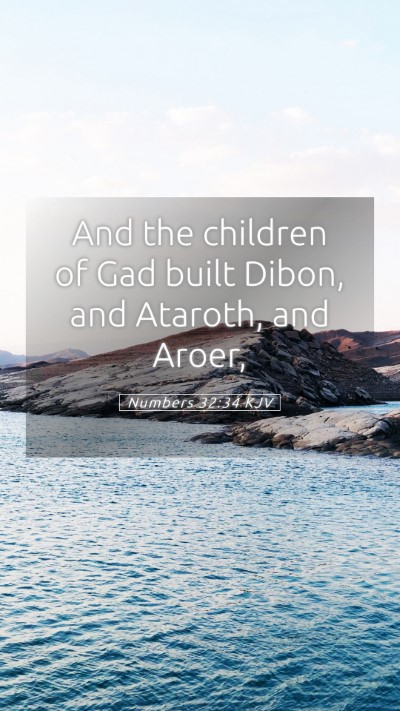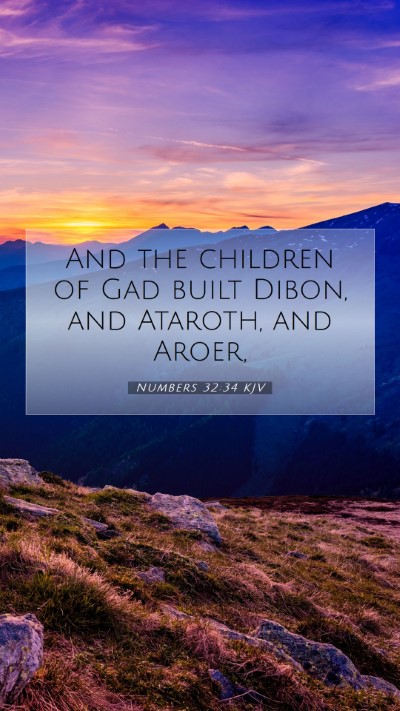Understanding Numbers 32:34 - Bible Verse Commentary
Numbers 32:34 states, “And the children of Gad built Dibon, and Ataroth, and Aroer.” This verse marks a significant moment in the wilderness journey of the Israelites, particularly for the tribes of Gad, Reuben, and the half-tribe of Manasseh. In this summary, we will explore the biblical significance of this verse, its historical context, and its application in modern life.
Historical Context of Numbers 32
The historical setting of Numbers 32 is critical to understanding this verse. After decades of wandering in the wilderness, the Israelites were on the verge of entering the Promised Land when two of the tribes expressed their desire to settle in the land east of the Jordan River. They were specifically attracted to the rich pastures suitable for livestock, reflecting their economic considerations.
- Tribal Leadership: The tribe of Gad was known for its strong warriors and commitment to the community.
- Promise of Conquest: The leaders of Gad and Reuben promised to support their brothers by fighting alongside them to secure the land west of the Jordan.
Bible Verse Interpretations
Commentators like Matthew Henry and Adam Clarke provide insights into the motivations and implications of Gad building cities. Henry mentions that these cities represented not only a physical settlement but also a spiritual commitment to God and to support their brethren in the conquest that lay ahead.
Significance of City Building
In ancient Israel, the act of building cities was significant. Cities provided security and a place for community living. The construction of Dibon, Ataroth, and Aroer by the Gadites signifies their intent to establish a lasting presence in the region.
Biblical Exegesis of Numbers 32:34
To further understand the implications of this verse, let’s analyze the language and the structure. The building of cities by the Gadites represents a commitment to their families, showing how faith and responsibility intersect in the lives of believers. This commitment, however, must be balanced with a readiness to uphold communal responsibilities, which is emphasized in the surrounding verses.
Application in Daily Life
This verse serves as a reminder for us today regarding the importance of considering our commitments. Like the Gadites, we may find ourselves at a crossroads where we must build something in our lives—whether it’s in our careers, families, or spiritual communities.
Key Lessons from Numbers 32:34
- Prioritize Community: Our commitments should consider the wellbeing of our larger communities.
- Balance Personal and Collective Goals: Assess how personal decisions affect collective outcomes.
- Sustain Spiritual Focus: Building our ‘cities’ should always align with our spiritual mission and covenants.
Cross References
This verse connects with several other passages that explore themes of settlement, responsibility, and community in the Bible:
- Joshua 1:12-15: Discusses the tribes' commitments in the fight for the Promised Land.
- Numbers 32:6-15: Details the negotiations and promises made by the tribes of Gad and Reuben.
- Hebrews 3:16-19: Provides a reflection on faith and the failure of the Israelites to enter the promised rest due to disobedience.
Conclusion
Numbers 32:34 encapsulates the idea of settling into God’s promises while remaining committed to our causes and communities. Through understanding this verse, believers gain insights essential for biblical exegesis, and for applying ancient wisdom in contemporary settings, enhancing both individual and collective lives.
Additional Resources for Bible Study
For those seeking to deepen their understanding of Bible verses, including Numbers 32:34, consider the following resources:
- Join a Bible study group to discuss interpretations and personal applications.
- Utilize online Bible study tools to explore commentaries and various translations.
- Attend Bible study courses that focus on Old Testament narratives and their implications.


